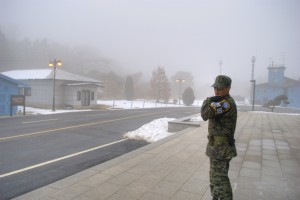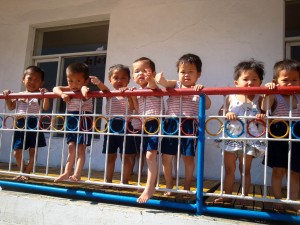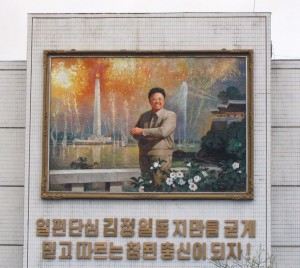In July of 2010, I spent two weeks at an orphanage nestled deep in the green hills of Yanji, China. The thing that set this place apart was that the children there were the orphans of North Korean defectors. The orphanage itself—Hope Garden—was not far from the China-North Korea border. As we walked along the Tumen River on one of our day trips, it made my heart palpitate just to think North Korea was only a stone’s throw away.
What I didn’t know at the time was, in that remote corner of North Korea—so close to the border of China and Russia—lay Camp 22. Camp 22 is North Korea’s largest concentration camp. And as I later found out, this is usually the camp where Christians, along with other anti-revolutionary religious criminals, are sent. Unimaginable acts of torture and cruelty are reported to be inflicted on innocent people. Their “crimes” range from complaining of hunger, throwing away a newspaper with Kim Jong-Il’s face on it, sharing Bibles or trying to escape to China.
 Sadly, Camp 22 is only one of many concentration camps hidden in the mountains of North Korea. As of 2012, the U.S. Commission on International Religious Freedom estimates 150,000 to 200,000 men, women and children are tortured, overworked (often to death), and experimented on for their alleged political wrongdoings. They say babies are stamped to death, and most of the prisoners have missing limbs as a result of torture. Those who confess to having faith in Jesus Christ face life imprisonment or public execution.
Sadly, Camp 22 is only one of many concentration camps hidden in the mountains of North Korea. As of 2012, the U.S. Commission on International Religious Freedom estimates 150,000 to 200,000 men, women and children are tortured, overworked (often to death), and experimented on for their alleged political wrongdoings. They say babies are stamped to death, and most of the prisoners have missing limbs as a result of torture. Those who confess to having faith in Jesus Christ face life imprisonment or public execution.
All these facts and figures can be intimidating, and feel burdensome. We are supposed to feel something for these people (love, compassion, righteous anger?), but sometimes we just don’t. There’s also Africa, China, India, the Pacific Islands and so many other places which demand our attention as Christians. We are supposed to do something about it, but how? Hop on a plane to Pyongyang and proclaim the Gospel? Not likely! Fund missions or humanitarian aid? Those things are fine, but I believe the most important step after awareness is letting North Korea become real to you.
This is somewhat harder than letting China or Africa become “real”. For one thing, North Korea is a place of contradictions and conflicting images; we perceive it as farcical, horrifying, demonic, and pitiful. The media loves to portray the country as an “axis of evil” and tend to show only the insane Orwellian nature of its totalitarian government. Almost daily we are bombarded with a certain idea of North Korea. So we pause to shake our heads at the madness of it all, and then go about our daily lives. But there is more to North Korea than the goose-stepping military parades, and the harebrained schemes of Kim Jong-Il and now, his son Kim Jong-Un. Perhaps North Korea is not real to us because we don’t often get the opportunity to hear real stories. Perhaps we suffer from North Korea fatigue.
So let me tell you a more personal story: my story, of how North Korea became real to me. I didn’t always have a clear vision, or understand why God had planted in me a heart for North Korea. As a South Korean, with one grandparent who escaped to the South during the war, I grew up hearing story after story about our brethren “up north”. The continued division of our nation (and for us, our family) was meant to be a tragedy to North and South alike, but I just didn’t feel it. “Mum,” I’d say, “I’m Aussie, born and bred. I can’t even relate properly to South Koreans, so you’ll excuse me if I don’t really care about the North.” I suffered from North Korea fatigue.
But I felt God gently and slowly (probably so I wouldn’t bolt like Jonah) guiding me. Right now, I’m in my Honours year researching North Korean defectors and the history of the Korean Diaspora in East Asia, with a focus on the China-North Korea border region. And in hindsight, it’s easy to see how the pieces came together. It began in the form of a short story I wrote based on my family history. After that came my interest in China, and eventually East Asian politics.

The final push came during my trip to Yanji. Before we left for China, the list of the children’s names was a bunch of meaningless Korean characters on a piece of paper. Yet when we reached the orphanage those names became real, breathing children who were a part of God’s fearful and wonderful creation. There was Yeon-hee, a six year old with gorgeous long eyelashes, but a mouth full of rotting teeth, due to being fed lollies by her caretaker when she cried for her mother’s milk as an infant; In-yong, who was blind in one eye and was mentally handicapped, but who would give me the sweetest gifts from the heart: daisy-chain bracelets and drawings of himself with his orphanage “family”; and Ho-guk, who showed me the best place in the woods to catch frogs and dragonflies. These children were all so desperately in need of love. It was impossible not to reach out to them, and to want to give it to them.
The moment those children became real to me, the people of North Korea became real to me by extension. They were no longer a faceless, far-away mass. But why, God? Throughout the trip, I felt overwhelmed by a sense of helplessness. I wondered how I could really make a difference. I was all the more disheartened when I heard that the Chinese Government closed the orphanage down not long after my visit. Similarly, for those who hoped the succession of Kim Jong-Un would bring change to North Korea, the recent nuclear developments and provocative military behaviour will have been a discouraging turn of events.
But there is a glimmer of hope in North Korea, and it comes from the community of Christian believers. How powerful is the testimony of a North Korean believer who believes in the face of not only death, but a lifetime of persecution and torture? For this reason, in spite of all the utter darkness and deadness and spiritual brokenness of North Korea, I feel hopeful about the amazing things that God has planned for His people. We are a part of that plan. “Tell the world that we are part of the body of believers,” a North Korean Christian once pleaded with Melanie Kirkpatrick, author of Escape from North Korea. “Don’t forget us.”
 We are accustomed to harrowing images of starving children, their sunken eyes, hollow faces and rib cages dangerously protruding. We are too familiar with images of their maniacal (now deceased) stout dictator, with his frizzy perm and boxy, grey communist suits. Perhaps we’re so familiar with these images and North Korean brinkmanship that our first reaction is: “There they go again, those crazy North Koreans.” But let’s not allow our hearts to become desensitised to the plight of the North Korean people. It is our responsibility as Christians not to forget our brothers and sisters, adrift and alone in that land of spiritual darkness.
We are accustomed to harrowing images of starving children, their sunken eyes, hollow faces and rib cages dangerously protruding. We are too familiar with images of their maniacal (now deceased) stout dictator, with his frizzy perm and boxy, grey communist suits. Perhaps we’re so familiar with these images and North Korean brinkmanship that our first reaction is: “There they go again, those crazy North Koreans.” But let’s not allow our hearts to become desensitised to the plight of the North Korean people. It is our responsibility as Christians not to forget our brothers and sisters, adrift and alone in that land of spiritual darkness.
So wake up Christians! Shake off that North Korea fatigue. Look up videos of testimonies from defectors. There is a wealth of information on the internet if you search hard enough. And most importantly, pray. For those of us who are not sure what to pray about, we need to be more involved by being more aware. Firstly, pray that God would give us His heart for the nation of North Korea. Ask for a heart of love and compassion, a heart that is stirred into action at the sight of injustice and spiritual darkness. Then lift up a prayer for believers there, that the church there may stay far from false teachers and heresies (which often trickle in from across the Chinese border), and that believers there may be strengthened and find peace in Christ.
Start listening and learning. Watch the stories of people who’ve escaped North Korea:
The moving testimony of young woman, Lee Hyeonseo.
How you can help: LINK – Liberty in North Korea.
Photos from top:
Sunrise over Pyongyang http://www.flickr.com/photos/yeowatzup/2918045591/
Demilitarised zone between North and South Korea http://www.flickr.com/photos/adam_inglis/5423951814/sizes/l/in/photostream/
Orphans in North Korea http://www.flickr.com/photos/fmsc/8019596059/
Wall mural featuring Kim Jong-Il http://www.flickr.com/photos/28705377@N04/4644100274/.
Email This Story
Why not send this to a friend?
